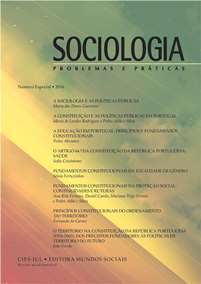The constitutional principles applicable to spatial planning
DOI:
https://doi.org/10.7458/SPP2016NE10352Abstract
This article aims to analyse the position of spatial planning in the Constitution of the Portuguese Republic (CRP), while considering the various constitutional principles and bases and the developments introduced by the periodic revisions since the original text in 1976. The authors look at how the CRP makes spatial planning one of the state’s fundamental tasks, and at how it is linked to the rights to housing and urbanism, the environment and quality of life, the promotion of economic and social development, territorial cohesion and the implementation of the principles of subsidiarity, autonomy, decentralisation and participation, presenting a contextual reading of the changes over the years. They conclude that the constitutional status of spatial planning is broad, demonstrating a theoretical / conceptual social importance that is not fully reflected in its practical application.Downloads
Published
2016-12-02
Issue
Section
Articles
License
Authors who publish in this Journal must agree the following terms and conditions:
- Authors retain copyright and grant the Journal the right to first publication, while simultaneously agreeing to a Creative Commons Attribution License, which allows others to share their work on condition that they cite the original author(s) and recognise that the latter’s work was first published in this Journal.
- Authors are authorised to enter into additional contracts separately, for non-exclusive distribution of the version of the work that is published in this Journal (e.g. publication in an institutional repository or as a book chapter), subject to recognition of initial publication in this Journal.



